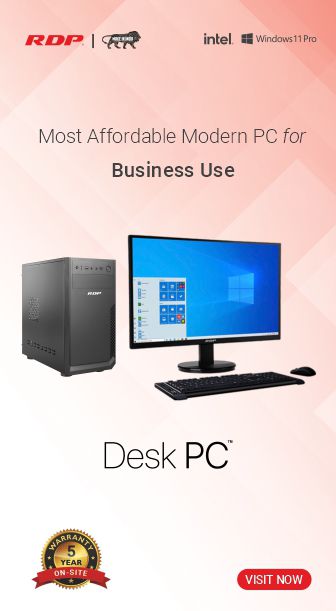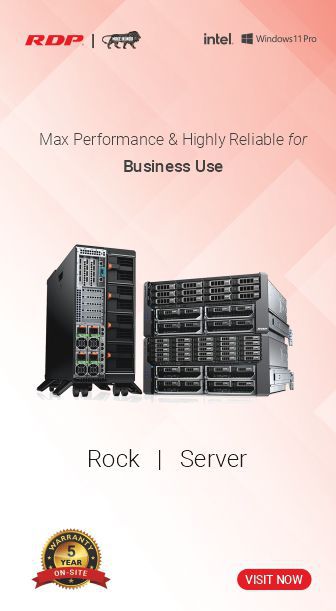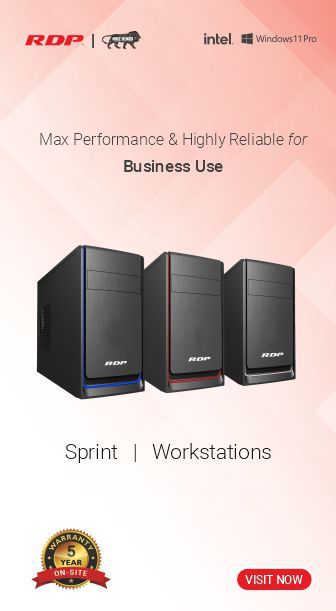Who We Serve
India's value-for-money IT hardware brand
14 years. 28,000 sq ft. 100,000+ devices. From desktops to data center — designed, engineered, and manufactured in India.
Why choose RDPProducts
Desktops to data center, all Make in India
14 product categories across compute, AI, and data center. Deployment-ready from our 28,000 sq ft facility.
Download Product CatalogAI Solutions
Sovereign AI infrastructure
End-to-end AI compute under one sovereign umbrella. Designed here. Manufactured here. Supported here.
Talk to a Solutions ArchitectSupport
SLA-driven. Not ticket-driven.
Warranty. SLA. On-site service. Account management. Every commitment documented, every response time defined.
Download SLA CommitmentCompany
Built on process, not promises
ISO 9001. PLI 2.0. SOP-led manufacturing. The systems behind every device we ship.
Our Story











The Power Behind Modern Business: Why Servers are Critical to Your Success
In today’s interconnected world, servers are the backbone of nearly every digital service we rely on. From small businesses to multinational corporations, servers ensure data is stored securely, applications run smoothly, and users have seamless access to services. As businesses continue to grow and digital transformation takes center stage, understanding the importance of servers is essential.
What are Servers?
A server is a powerful computer or system that provides data, services, or programs to other computers, known as clients, over a network. While it may seem similar to a regular desktop, servers are specifically designed to handle heavy workloads, run 24/7, and manage multiple users simultaneously. Servers come in various types depending on the tasks they handle, such as file servers, database servers, web servers, and application servers.
Why Are Servers Important?
Centralized Data Management Servers allow businesses to centralize their data, applications, and processes. Instead of individual employees managing separate files, all information can be stored and accessed in one location. This not only simplifies data management but also enhances security, ensuring sensitive business information is safeguarded.
Improved Efficiency and Collaboration By using a server, businesses can ensure that employees can work more efficiently and collaborate seamlessly. File sharing, project management tools, and communication platforms are hosted on servers, enabling teams to access them from anywhere, at any time. This is especially critical in today’s hybrid or remote work environments.
Scalability As your business grows, so do your IT needs. Servers are designed to scale with your business. Whether it’s increasing storage capacity, processing power, or adding new services, servers can be easily upgraded to meet the demands of a growing organization.
Enhanced Security With cyber threats on the rise, businesses must prioritize data security. Servers offer robust security features, including encryption, firewalls, and advanced access controls. By centralizing your data, you reduce the risk of vulnerabilities that arise from scattered systems, ensuring that sensitive information is protected from unauthorized access.
24/7 Availability A critical benefit of servers is their ability to provide round-the-clock service. Whether you're running a customer-facing website or a crucial internal application, servers ensure that your systems remain operational, minimizing downtime and maximizing productivity.
Types of Servers for Your Business
File Servers: These are used to store and manage files in a centralized location, making them easily accessible to employees across the network.
Web Servers: These servers are responsible for hosting websites and ensuring they are available to users online 24/7. Popular platforms like Apache and Nginx are examples of web server software.
Database Servers: These store, retrieve, and manage vast amounts of data, essential for businesses dealing with customer records, transactions, or large datasets.
Application Servers: Application servers host and run specific software applications that clients can access over a network, offering centralized processing power and storage.
Choosing the Right Server for Your Business
Selecting the right server for your business depends on your specific needs. Here are a few key considerations:
Future-Proofing Your Business with AI-Powered Servers
As we look toward the future, AI and machine learning are transforming how servers operate. RDP’s AI-powered servers offer cutting-edge technology designed to handle the demanding needs of modern businesses. By leveraging advanced AI algorithms, these servers can optimize performance, predict potential issues before they arise, and offer superior energy efficiency. Whether it’s handling large-scale data processing, running complex applications, or powering AI workloads, our servers are built to deliver.
Conclusion
Servers are more than just a piece of hardware—they are the central hub of your business’s digital operations. Investing in a robust, scalable, and secure server infrastructure ensures that your business is prepared for growth, innovation, and the demands of the digital age. At RDP, we are committed to delivering high-performance server solutions tailored to meet your business needs.
Explore our range of servers today and discover how we can help your business stay ahead in the digital future.